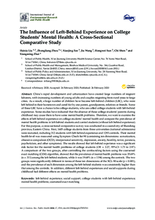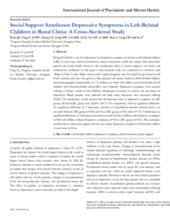Displaying 91 - 100 of 323
The purpose of this study was to conduct a systematic review and meta-analysis on the effectiveness of parenting interventions in preventing violence against children.
According to this article from the Japan Times, Japan places around 85 percent of children and babies who need care into institutions, and "British-based experts on the welfare and rights of vulnerable children" are calling for increased provisions for foster care in the country.
The authors of this article investigated the associations of individual- and family-related factors with psychological distress in a sample of left-behind children (LBC) aged 10–15 using logistic regression. A total of 954 LBC were included in the study.
This study examined the effects of left-behind experience on college students’ mental health and compared the prevalence of mental health problems in left-behind students and control students (without left-behind experience) in China.
This study examined the association between parental migration and early childhood nutrition of left-behind children (LBC) in rural China.
This study examined the association between parental migration and early childhood nutrition of left-behind children (LBC) in rural China.
This study aimed to evaluate the effectiveness of the Happy Parenting: Round-the-Clock Parenting (HPRCP) program for Macau parents on shift work, using randomized controlled trial design.
In this paper a cross-sectional study was conducted in a common rural village in China to examine the amelioration effect of social support for left-behind children (LBC).
In this study, the authors aim to help clarify the pathway from parental supervisory neglect to peer victimization through the mediating roles of self-esteem and internalizing problems among adolescents in South Korea.
This study aimed to survey the extent of social anxiety in rural left-behind children in China, reveal the relationship of social anxiety to family cohesion and adaptability, and provide a theoretical basis for health intervention.



